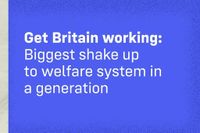Labour MPs are voicing their concerns over the government’s sweeping welfare reform plans, labeled as the "biggest reforms to employment support in a generation." During announcements made on March 18, 2025, the government faced significant backlash from backbench MPs primarily due to proposed cuts to Personal Independence Payments (PIP) for disabled individuals. Although the government quickly ruled out these real-terms cuts, tensions remain high within the party, with fears of potential rebellion brewing in the Commons.
Work and Pensions Secretary Liz Kendall's statements revealed the government's plans aimed at saving approximately £5 billion through these reforms. While some Labour backbenchers backed the idea of welfare reform amid soaring Treasury costs related to health benefits, others expressed reservations about specific cuts affecting vulnerable populations. Kendall proposed innovative ideas such as consulting on the implementation of new "time-limited unemployment insurance," merging Jobseeker’s Allowance (JSA) and Employment and Support Allowance (ESA). The plans also include the eventual abolishment of the Work Capability Assessment by 2028.
The proposed reforms seek to create safety nets for people making the transition back to work. The government intends to legislate for a “right to try,” permitting those on sickness benefits to attempt work without penalty to their benefits. Cheers erupted from the government benches following these announcements as Kendall confirmed no plans to mean-test or freeze PIP.
Despite the cabinet’s united front supporting these welfare transformations, concerns were articulated across the board, particularly by Clive Lewis, who warned of significant pain and difficulty inflicted on his constituents. “They do not think this is the kind of action a Labour government takes,” he stated, reflecting what many believe to be a misstep politically.
Criticism was echoed by other Labour MPs, with one expressing disbelief at the party's faltering political messaging. They noted, "There was a perfectly progressive way to drive this reform... but it has turned people’s stomachs." Another MP articulated fears of losing the narrative, stating, “We lost the narrative early, and the look isn’t good.” The internal conflict appears extensive, with reports of MPs voicing “deep concerns” about the approach taken during recent meetings.
Trade union representatives also chimed in with warnings against the dismantling of social support for the most vulnerable. Christina McAnea, the general secretary of Unison, asserted, “Hitting those least able to speak up for themselves is never acceptable.” Echoing sentiments of dissent within party ranks, Jess Barnard from the National Executive Committee commented, “Starmer is pushing through austerity 2.0 without the mandate to do it.”
The urgency behind these reforms is primarily driven by the current financial sustainability of the support system. The number of working-age individuals receiving health and disability benefits is projected to rise from 2 million to approximately 4.3 million by 2029, generating costs expected to exceed £70 billion annually.
Kendall highlighted the necessity for increased employment support, announcing investments to implement these changes. The government is aiming to address the rapidly growing number of out-of-work benefit claimants, with statistics showing 2.8 million people out from long-term illness, one of the highest rates globally.
Meanwhile, as the government prepares to implement these reforms, it is apparent they face challenges from both within and outside their party structure. It’s projected the proposed reforms could reframe the dialogue surrounding welfare, hopefully ensuring dignity for those unable to work. Labour leaders are cautious, acknowledging the fine line between necessary reforms and preserving the party's long-standing commitments to support vulnerable populations.
Transformations being proposed include the scrapping of the Work Capability Assessment which has been heavily criticized for its flaws and failure to recognize the reality of many individuals unable to work. This re-prioritization also aligns with long-term goals aimed at delivering improved financial accountability and extending systemic support for those who truly need it.
Through this reform initiative, the government hopes to encourage active participation among those capable of working. Prime Minister Keir Starmer emphasized, “This government will always protect the most severely disabled people to live with dignity.” He argued passionately for the need to rectify the welfare system to not just alleviate pressure on the taxpayer but also empower individuals to seek independent lives.
While change looms on the horizon, the announcement ignites debates on whether the government can reconcile fiscal responsibility with the pursuit of social justice for disabled individuals trapped beneath bureaucracy—without, as many fear, undercutting the very principles the Labour Party strives to uphold. The government’s approach must tread carefully as relations between the party and its stalwarts—particularly those advocating for the most vulnerable—become increasingly strained during this transition.
Whether the proposed reforms can unify rather than divide the party remains to be seen. Across the halls of Westminster, MPs prepare to voice their opinions on the upcoming reform package, aware they could very well shape Labour’s identity moving forward. Many are calling for clarity, commitment, and above all, compassion, from their leadership as they navigate through one of the biggest hurdles faced since entering office.







